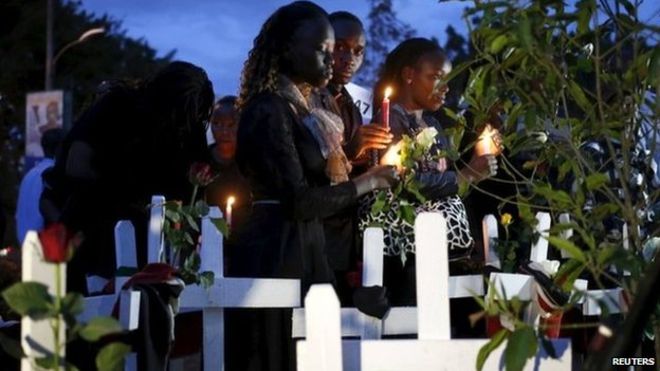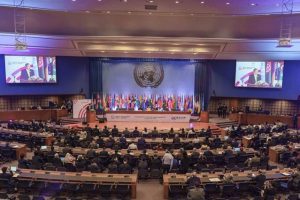NAIROBI, (Kenya) — Veronica Syokau loved to swim. Mary Muchiri Shee was a keen model. Mark Dennis Mutuma enjoyed basketball and endlessly pulled pranks on friends.
As Kenyans struggled to recover from the shock of last week’s shooting rampage by al-Shabaab militants that left 148 dead, parents, relatives and friends wrestled with the difficult task of bringing home the remains of their loved ones.
Thursday’s attack at Garissa University College struck a particular nerve because, in a country with no significant natural resources and a scant social safety net, parents make huge sacrifices to educate their offspring in the hope that they in turn will support their families – and in many cases whole clans. The killings robbed many families of their best and brightest – young people on whose shoulders rested hopes and aspirations.
“In my home there are no cows. I sold them to pay his school fees,” said Stanley Maina Waiharo, who lost his firstborn son, John Mwangi Maina, 22. “I took a loan of 200,000 shillings (£1,450) to educate my son so that he could have a better life than me. Then these people just took him away.”
Maina, a tailor based in a village in the highland town of Muranga, about two hours’ drive from the capital, Nairobi, said he had struggled to put his son through high school and send him to university to study business management. John was the first person in his wider family to get a college education, he said.
“This was a boy who, when everyone else was out there playing, he was always indoors studying. He took his studies very seriously. We had so much hope in him.”
Mary Oloo, the aunt of Peter Odhiambo, a 19-year-old economics student, was also grieving. “This boy who we will bury soon, this boy was going to help us board a plane one day,” she said. “I really looked forward to his graduation. Is this the graduation we were to come to?”
The macabre task of identifying the victims added an extra layer of agony. “All my son’s teeth are missing. His eyes were gouged out. Where did they take his eyes?” said Oloo, who like many in the close-knit family circles of Kenyan communities referred to a nephew as her son. “But we are grateful because others haven’t even found their people. At least our son can rest.”
#147notjustanumber
A candlelit vigil was due to be held at sunset in the capital, and Kenya’s Twitter community, one of the most active on the continent, memorialised the dead using the hashtag #147notjustanumber.
There was sharp criticism of Kenyan authorities for their failure to stop repeated atrocities by the militants. University students marched through Nairobi waving placards denouncing al-Shabaab and demanding that President Uhuru Kenyatta’s administration offer security for students. “We might be next,” Walter Mutai, a 22-year-old statistics student at Moi University, told the Associated Press. “These people, they can target anywhere.”

Hundreds of Muslims marched through the streets of Garissa in sweltering heat to condemn the killings. Clerics said they would form an umbrella body to monitor institutions involved in radicalisation, and urged the government to recruit more ethnic Somalis to monitor the activities of terrorists.
There were also appeals for unity amid fears that repeated atrocities by al-Shabaab might trigger inter-communal strife.
In a measure of how rattled Kenyan society has become, many of the popular videos and messages on social media involved discussions on how to react to attacks by al-Shabaab, who seem to have abandoned complex plots involving car bombs and have now adopted the frighteningly low-tech method of sending in gunmen willing to die while taking scores of lives.
The emerging consensus seemed to be that people should either run or fight the attackers, because obeying their commands as many of the students did when asked to lie face down in their hostels would result in certain death.
“I would urge Kenyans to fight for their lives in case of an attack,” Pius Mwachi, the deputy director of the national disaster management unit, told the Daily Nation. “People should not surrender or else they will be killed like cockroaches.”
Because public universities in Kenya admit the brightest students from every district based on a quota system, the tragedy left a trail of grief touching virtually every village.
Newspapers continued to record the stories of stricken families who described the high expectations they had for their loved ones. “My son Abel Mukhwana was the only person who had managed to join a university in our village,” Jane Chepkemboi told the Standard. “We were hopeful one day he would help change the fortunes of our society.”
Details emerged of the casual cruelty of the killers, who included a recent law graduate and son of a minor Kenyan official. One survivor, Francis Gichohi, 24, said the attackers lured girls out of their hostel saying their religion did not allow the killing of females. When the girls obeyed the command, the attackers shot them all in the head.




